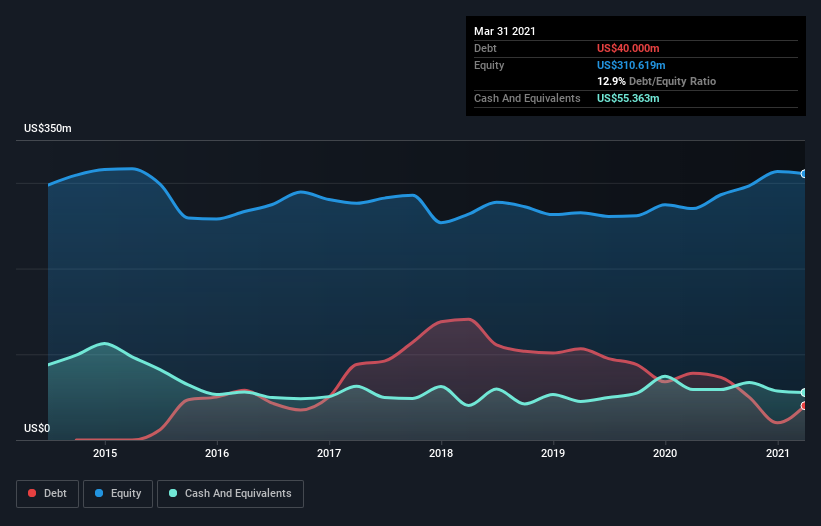Is Universal Electronics (NASDAQ:UEIC) Using Too Much Debt?
Some say volatility, rather than debt, is the best way to think about risk as an investor, but Warren Buffett famously said that 'Volatility is far from synonymous with risk.' So it might be obvious that you need to consider debt, when you think about how risky any given stock is, because too much debt can sink a company. We note that Universal Electronics Inc. (NASDAQ:UEIC) does have debt on its balance sheet. But is this debt a concern to shareholders?
What Risk Does Debt Bring?
Debt is a tool to help businesses grow, but if a business is incapable of paying off its lenders, then it exists at their mercy. Ultimately, if the company can't fulfill its legal obligations to repay debt, shareholders could walk away with nothing. However, a more common (but still painful) scenario is that it has to raise new equity capital at a low price, thus permanently diluting shareholders. Of course, debt can be an important tool in businesses, particularly capital heavy businesses. The first thing to do when considering how much debt a business uses is to look at its cash and debt together.
Check out our latest analysis for Universal Electronics
How Much Debt Does Universal Electronics Carry?
As you can see below, Universal Electronics had US$40.0m of debt at March 2021, down from US$78.0m a year prior. However, its balance sheet shows it holds US$55.4m in cash, so it actually has US$15.4m net cash.
How Strong Is Universal Electronics' Balance Sheet?
We can see from the most recent balance sheet that Universal Electronics had liabilities of US$185.2m falling due within a year, and liabilities of US$15.0m due beyond that. On the other hand, it had cash of US$55.4m and US$150.9m worth of receivables due within a year. So it actually has US$6.09m more liquid assets than total liabilities.
Having regard to Universal Electronics' size, it seems that its liquid assets are well balanced with its total liabilities. So it's very unlikely that the US$666.8m company is short on cash, but still worth keeping an eye on the balance sheet. Simply put, the fact that Universal Electronics has more cash than debt is arguably a good indication that it can manage its debt safely.
In addition to that, we're happy to report that Universal Electronics has boosted its EBIT by 70%, thus reducing the spectre of future debt repayments. There's no doubt that we learn most about debt from the balance sheet. But ultimately the future profitability of the business will decide if Universal Electronics can strengthen its balance sheet over time. So if you want to see what the professionals think, you might find this free report on analyst profit forecasts to be interesting.
Finally, a company can only pay off debt with cold hard cash, not accounting profits. While Universal Electronics has net cash on its balance sheet, it's still worth taking a look at its ability to convert earnings before interest and tax (EBIT) to free cash flow, to help us understand how quickly it is building (or eroding) that cash balance. Happily for any shareholders, Universal Electronics actually produced more free cash flow than EBIT over the last three years. That sort of strong cash conversion gets us as excited as the crowd when the beat drops at a Daft Punk concert.
Summing up
While we empathize with investors who find debt concerning, you should keep in mind that Universal Electronics has net cash of US$15.4m, as well as more liquid assets than liabilities. The cherry on top was that in converted 174% of that EBIT to free cash flow, bringing in US$50m. So we don't think Universal Electronics's use of debt is risky. When analysing debt levels, the balance sheet is the obvious place to start. But ultimately, every company can contain risks that exist outside of the balance sheet. For example, we've discovered 2 warning signs for Universal Electronics that you should be aware of before investing here.
Of course, if you're the type of investor who prefers buying stocks without the burden of debt, then don't hesitate to discover our exclusive list of net cash growth stocks, today.
This article by Simply Wall St is general in nature. It does not constitute a recommendation to buy or sell any stock, and does not take account of your objectives, or your financial situation. We aim to bring you long-term focused analysis driven by fundamental data. Note that our analysis may not factor in the latest price-sensitive company announcements or qualitative material. Simply Wall St has no position in any stocks mentioned.
Have feedback on this article? Concerned about the content? Get in touch with us directly. Alternatively, email editorial-team (at) simplywallst.com.

 Yahoo Finance
Yahoo Finance 
